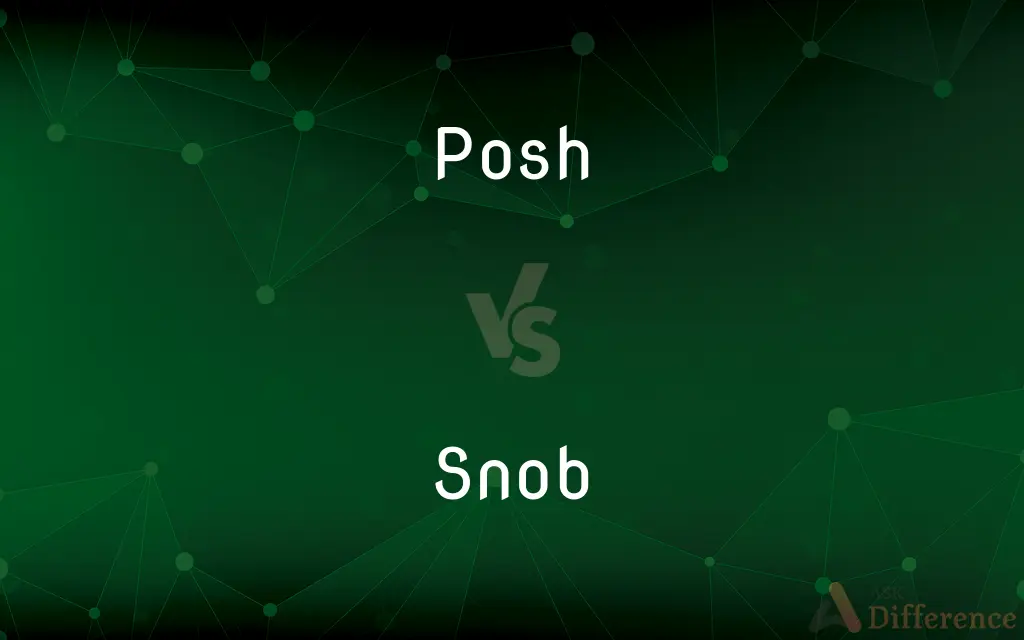Posh vs. Snob — What's the Difference?
Edited by Tayyaba Rehman — By Fiza Rafique — Updated on March 19, 2024
Posh connotes luxury and sophistication, while snob suggests disdain for those perceived as inferior.

Difference Between Posh and Snob
Table of Contents
ADVERTISEMENT
Key Differences
Posh refers to things or people associated with high quality, luxury, and sophistication, often implying elegance and being fashionable or exclusive. Snob, on the other hand, is used to describe someone who believes they are superior in taste, sophistication, or intellect and often looks down on those they consider inferior.
The term "posh" can describe places, items, or lifestyles that embody opulence and exclusivity, such as posh hotels or posh neighborhoods, emphasizing their appeal to those with refined tastes and the means to afford such luxuries. In contrast, a "snob" may actively seek out these posh environments not just for enjoyment but as a way to affirm their social status and to differentiate themselves from others whom they view as less worthy.
Posh can often be a neutral or positive term, highlighting the desirability and attractiveness of something or someone's refined style. However, being labeled a snob carries a negative connotation, suggesting a lack of warmth and an unwarranted sense of superiority based on subjective criteria like wealth, education, or aesthetic preferences.
While poshness is typically related to material wealth and the outward signs of luxury, snobbery extends beyond the material to attitudes and behaviors. A snob may dismiss or belittle anything or anyone that does not meet their personal standards, which can include cultural tastes, social affiliations, and even intellectual pursuits.
It's also worth noting that one can appreciate or partake in posh settings or items without being a snob. The key difference lies in the attitude towards others: enjoying luxury does not inherently involve looking down on those with different tastes or means, whereas snobbery is characterized by an exclusionary attitude and a sense of superiority over others.
ADVERTISEMENT
Comparison Chart
Definition
Associated with luxury and sophistication
Believes in their superiority and looks down on others
Connotation
Neutral or positive, implies elegance
Negative, implies disdain and exclusion
Associated With
Material wealth, luxury, refined style
Attitudes, behaviors, subjective standards
Emphasis
Quality, exclusivity
Superiority, differentiation from perceived inferiors
Relation to Others
Can be appreciated without superiority
Defined by attitudes towards others
Compare with Definitions
Posh
Indicating high quality.
He wore a posh suit to the interview to impress.
Snob
Prefers exclusivity to show superiority.
As a snob, he only attends events he deems worthy of his presence.
Posh
Elegant and fashionable.
The gala was a gathering of the city’s posh and powerful.
Snob
Exclusionary in social settings.
They were known to be snobs, rarely interacting with anyone outside their social circle.
Posh
Characterized by luxury and sophistication.
She prefers staying in posh hotels when she travels.
Snob
Displays disdain for those deemed inferior.
She was a snob about fashion, turning her nose up at anyone not dressed in designer.
Posh
Desirable and attractive.
They enjoyed a posh dinner at the city’s most renowned restaurant.
Snob
Judges others based on subjective standards.
The literary snob wouldn’t even consider reading popular fiction.
Posh
Exclusive and upscale.
The posh neighborhood is known for its gated communities.
Snob
Someone who thinks they are better than others in taste.
He’s a snob when it comes to wine, dismissing anything less than perfect.
Posh
Fashionable or luxurious
A posh hotel.
Snob
Snob is a pejorative term for a person who believes there is a correlation between social status (including physical appearance) and human worth. Snob also refers to a person who feels superiority over those from lower social classes, education levels, or other social areas.
Posh
Typical of the upper class, especially in the United Kingdom
A posh upbringing.
Snob
A person who looks down on or snubs people who that person considers as being of a lower social class.
Posh
Affectedly imitating characteristics of the upper class; pretentious
A posh accent.
Snob
A person who feels an undue sense of intellectual or aesthetic superiority
A musical snob.
Posh
Associated with the upper classes.
She talks with a posh accent.
Snob
A person who wishes to be seen as a member of the upper classes and who looks down on those perceived to have inferior or unrefined tastes.
Posh
Stylish, elegant, exclusive (expensive).
After the performance, they went out to a very posh restaurant.
Snob
(colloquial) A cobbler or shoemaker.
Posh
Snobbish, materialistic, prejudiced, under the illusion that one is better than everyone else.
We have a right posh git moving in next door
Snob
(dated) A member of the lower classes; a commoner.
Posh
An exclamation expressing derision.
Snob
(archaic) A workman who works for lower wages than his fellows, especially one who will not join a strike (a scab#Noun).
Posh
Fragments produced by an impact
Snob
(Cambridge University) A townsman, as opposed to a gownsman.
Posh
Slush
Snob
A vulgar person who affects to be better, richer, or more fashionable, than he really is; a vulgar upstart; one who apes his superiors.
Essentially vulgar, a snob. - a gilded snob, but none the less a snob.
Posh
(normally in the phrasal verb posh up) To make posh, or posher.
Snob
A townsman.
Posh
Elegant and fashionable;
Classy clothes
A classy dame
A posh restaurant
A swish pastry shop on the Rue du Bac
Snob
A journeyman shoemaker.
Snob
A workman who accepts lower than the usual wages, or who refuses to strike when his fellows do; a rat; a knobstick.
Those who work for lower wages during a strike are called snobs, the men who stand out being "nobs"
Snob
A person regarded as arrogant and annoying
Common Curiosities
Can posh environments breed snobbery?
Yes, posh environments can sometimes foster snobbery, but not everyone in such environments is a snob.
What defines someone as posh?
Being associated with or indulging in luxury, sophistication, and high-quality, exclusive lifestyles.
What makes a person a snob?
A belief in one's superiority based on subjective criteria and a tendency to disdain those considered inferior.
Is it negative to be considered posh?
Not necessarily, as it often relates to luxury and sophistication, though it can carry implications of being out of touch.
Why is being a snob viewed negatively?
Because it involves looking down on others based on arbitrary standards, suggesting a lack of empathy and understanding.
Are all snobs wealthy?
No, snobbery is more about attitudes and beliefs than actual wealth.
Can snobbery be positive in any context?
While it can drive individuals to pursue excellence, the negative social implications generally outweigh any positive aspects.
What is the difference between having high standards and being a snob?
High standards concern personal choices and quality, whereas snobbery involves devaluing others who don't meet those standards.
Can you appreciate posh things without being a snob?
Absolutely. Appreciation for luxury doesn't require disdain for other lifestyles or tastes.
Is poshness inherent or acquired?
Poshness can be both inherent in certain environments or lifestyles and acquired through personal choices and interests.
Do snobs realize they are snobs?
Some might, but others may simply believe they are upholding high standards without recognizing the negative impact of their attitude.
How can one enjoy posh things without coming off as a snob?
By being open-minded and respectful of different tastes and backgrounds.
How has the perception of being posh changed over time?
Cultural shifts have both broadened the appreciation for luxury and increased awareness of the importance of inclusivity and humility.
Can someone be a snob about things other than material wealth?
Yes, people can be snobs about anything they consider a marker of superiority, including culture, education, and hobbies.
How does one deal with a snob?
Maintaining confidence in your own values and preferences, and avoiding taking their attitudes personally.
Share Your Discovery

Previous Comparison
Toad vs. Tadpole
Next Comparison
Glue vs. ClueAuthor Spotlight
Written by
Fiza RafiqueFiza Rafique is a skilled content writer at AskDifference.com, where she meticulously refines and enhances written pieces. Drawing from her vast editorial expertise, Fiza ensures clarity, accuracy, and precision in every article. Passionate about language, she continually seeks to elevate the quality of content for readers worldwide.
Edited by
Tayyaba RehmanTayyaba Rehman is a distinguished writer, currently serving as a primary contributor to askdifference.com. As a researcher in semantics and etymology, Tayyaba's passion for the complexity of languages and their distinctions has found a perfect home on the platform. Tayyaba delves into the intricacies of language, distinguishing between commonly confused words and phrases, thereby providing clarity for readers worldwide.














































